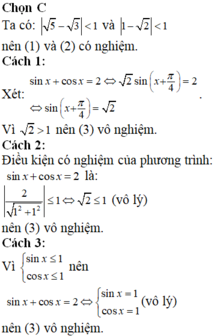Hãy nhập câu hỏi của bạn vào đây, nếu là tài khoản VIP, bạn sẽ được ưu tiên trả lời.

Chọn C
Ta có: ![]() nên (1) và (2) có nghiệm.
nên (1) và (2) có nghiệm.
Cách 1:
Xét: ![]()
![]() nên (3) vô nghiệm.
nên (3) vô nghiệm.
Cách 2:
Điều kiện có nghiệm của phương trình: sin x + cos x = 2 là: 
(vô lý) nên (3) vô nghiệm.
Cách 3:
Vì 

nên (3) vô nghiệm.

16. 2 x + 4. 2 x = 5. 5 x + 3. 5 x
⇔ 20. 2 x = 8. 5 x ⇔ 2 / 5 x = 2 / 5 1 ⇔ x = 1

a.
\(y'=-\dfrac{3}{2}x^3+\dfrac{6}{5}x^2-x+5\)
b.
\(y'=\dfrac{\left(x^2+4x+5\right)'}{2\sqrt{x^2+4x+5}}=\dfrac{2x+4}{2\sqrt{x^2+4x+5}}=\dfrac{x+2}{\sqrt{x^2+4x+5}}\)
c.
\(y=\left(3x-2\right)^{\dfrac{1}{3}}\Rightarrow y'=\dfrac{1}{3}\left(3x-2\right)^{-\dfrac{2}{3}}=\dfrac{1}{3\sqrt[3]{\left(3x-2\right)^2}}\)
d.
\(y'=2\sqrt{x+2}+\dfrac{2x-1}{2\sqrt{x+2}}=\dfrac{6x+7}{2\sqrt{x+2}}\)
e.
\(y'=3sin^2\left(\dfrac{\pi}{3}-5x\right).\left[sin\left(\dfrac{\pi}{3}-5x\right)\right]'=-15sin^2\left(\dfrac{\pi}{3}-5x\right).cos\left(\dfrac{\pi}{3}-5x\right)\)
g.
\(y'=4cot^3\left(\dfrac{\pi}{6}-3x\right)\left[cot\left(\dfrac{\pi}{3}-3x\right)\right]'=12cot^3\left(\dfrac{\pi}{6}-3x\right).\dfrac{1}{sin^2\left(\dfrac{\pi}{3}-3x\right)}\)

\(\Leftrightarrow\frac{3^{\sin^2x}+3}{3^{\sin^2x}}-4=2^{2.\frac{x}{2}}+2^{2.\frac{-x}{2}}-2\)
\(\Leftrightarrow\frac{\left(3^{\sin^2x}-1\right)\left(3^{\sin^2x}-3\right)}{3^{\sin^2x}}=\left(2^{\frac{x}{2}}-2^{\frac{-x}{2}}\right)^2\)
Vì 0 \(\le\sin^2x\)\(\le1\) nên 1 \(\le3\sin^2x\)\(\le3\) . Suy ra Vế trái \(\le0\)\(\le\) vế phải và phương trình tương đương với hệ :
\(\begin{cases}\left(3^{\sin^2x}-1\right)\left(3^{\sin^2x}-3\right)=0\\2^{\frac{x}{2}}-2^{\frac{-x}{2}}=0\end{cases}\)
Từ phương trình thứ 2, dễ dàng suy ra x=0 (thỏa mãn). Vậy x=0 là nghiệm duy nhất của phương trình đã cho.

ĐKXĐ: \(\left\{{}\begin{matrix}x\ne-\dfrac{\pi}{2}+k2\pi\\x\ne\dfrac{\pi}{6}+\dfrac{k2\pi}{3}\\\end{matrix}\right.\)
\(\dfrac{cosx-2sinx.cosx}{2cos^2x-1-sinx}=\sqrt{3}\)
\(\Leftrightarrow\dfrac{cosx-sin2x}{cos2x-sinx}=\sqrt{3}\)
\(\Rightarrow cosx-sin2x=\sqrt{3}cos2x-\sqrt{3}sinx\)
\(\Leftrightarrow cosx+\sqrt{3}sinx=\sqrt{3}cos2x+sin2x\)
\(\Leftrightarrow\dfrac{1}{2}cosx+\dfrac{\sqrt{3}}{2}sinx=\dfrac{\sqrt{3}}{2}cos2x+\dfrac{1}{2}sin2x\)
\(\Leftrightarrow cos\left(x-\dfrac{\pi}{3}\right)=cos\left(2x-\dfrac{\pi}{6}\right)\)
\(\Leftrightarrow\left[{}\begin{matrix}2x-\dfrac{\pi}{6}=x-\dfrac{\pi}{3}+k2\pi\\2x-\dfrac{\pi}{6}=\dfrac{\pi}{3}-x+k2\pi\end{matrix}\right.\)
\(\Leftrightarrow\left[{}\begin{matrix}x=-\dfrac{\pi}{6}+k2\pi\\x=\dfrac{\pi}{6}+\dfrac{k2\pi}{3}\left(loại\right)\end{matrix}\right.\)
Vậy \(x=-\dfrac{\pi}{6}+k2\pi\)


1.
PT $\Leftrightarrow 2^{x^2-5x+6}+2^{1-x^2}-2^{7-5x}-1=0$
$\Leftrightarrow (2^{x^2-5x+6}-2^{7-5x})-(1-2^{1-x^2})=0$
$\Leftrightarrow 2^{7-5x}(2^{x^2-1}-1)-(2^{x^2-1}-1)2^{1-x^2}=0$
$\Leftrightarrow (2^{x^2-1}-1)(2^{7-5x}-2^{1-x^2})=0$
$\Rightarrow 2^{x^2-1}-1=0$ hoặc $2^{7-5x}-2^{1-x^2}=0$
Nếu $2^{x^2-1}=1\Leftrightarrow x^2-1=0$
$\Leftrightarrow x^2=1\Leftrightarrow x=\pm 1$
$2^{7-5x}-2^{1-x^2}=0$
$\Leftrightarrow 7-5x=1-x^2\Leftrightarrow x^2-5x+6=0$
$\Leftrightarrow (x-2)(x-3)=0\Leftrightarrow x=2; x=3$
2. Đặt $\sin ^2x=a$ thì $\cos ^2x=1-a$. PT trở thành:
$16^a+16^{1-a}=10$
$\Leftrightarrow 16^a+\frac{16}{16^a}=10$
$\Leftrightarrow (16^a)^2-10.16^a+16=0$
Đặt $16^a=x$ thì:
$x^2-10x+16=0$
$\Leftrightarrow (x-2)(x-8)=0$
$\Leftrightarrow x=2$ hoặc $x=8$
$\Leftrightarrow 16^a=2$ hoặc $16^a=8$
$\Leftrightarrow 2^{4a}=2$ hoặc $2^{4a}=2^3$
$\Leftrightarroww 4a=1$ hoặc $4a=3$
$\Leftrightarrow a=\frac{1}{4}$ hoặc $a=\frac{3}{4}$
Nếu $a=\frac{1}{4}\Leftrightarrow \sin ^2x=\frac{1}{4}$
$\Leftrightarrow \sin x=\pm \frac{1}{2}$
Nếu $a=\sin ^2x=\frac{3}{4}\Rightarrow \sin x=\pm \frac{\sqrt{3}}{2}$
Đến đây thì đơn giản rồi.